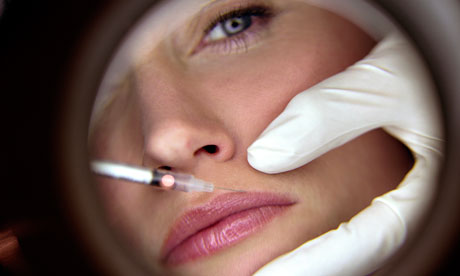
The refusal of successive governments to properly regulate an industry clearly capable of inflicting medical harm – the cosmetic treatments business – is widely regarded as one of the most baffling and inexcusable failures of health policy in recent years.
In 2005 a Labour government happy to mandate and regulate in order to improve healthcare, for example by imposing waiting time and treatment targets on the NHS, was in power when a group of experts convened by the then chief medical officer, Sir Liam Donaldson, recommended sweeping changes intended to protect patients. The case for wholesale reform was clear, it suggested.
Those findings are decidedly similar to the observations and demands published on Monday that emerged from submissions to a call for evidence on how to better regulate cosmetic surgery that was initiated by the coalition in August.
The 2005 experts said, for example, that: "The evidence that we reviewed suggested that avoidable harm is done to some patients. We note that demand is considerable, that it is growing, and that cosmetic surgery and procedures are widely advertised and promoted in ways which would be quite unacceptable to the public or to professional ethics if they were used in relation to other surgical interventions."
They added: "People should be confident that their treatment will be safe, that the medical and nurse practitioners who treat them are qualified and competent, and that they have the information they need to make informed decisions. Further than that, it must be the responsibility of individuals to protect themselves by checking on the qualifications, experience and commitment to good practice of the providers they use."
While some of the recommendations were implemented, other key ones – such as regulating the injection of Botox and dermal fillers (wrinkle-smoothing treatments), which are toxic and potentially damaging – were not.
Labour ministers also took cosmetic laser treatment out of regulation, despite the statutory risk assessment warning that such a move could harm patients. "Removing red tape" was put above patient safety, despite patients undergoing laser hair removal having been burned or disfigured.
Under Labour, the Department of Health's responses to the growing evidence of scandalous practices in the cosmetic treatments sector gave the impression that victims' injuries were the result of their own vanity, stupidity or both. Those harmed by NHS blunders deserved sympathy; those by cowboy cosmetic surgeons did not. This ignored the principle that anyone capable of inflicting serious harm through medical treatment, whether motivated by clinical or aesthetic reasons, should be subject to the same scrutiny.
Fast forward almost eight years and very similar concerns remain – aggressive marketing techniques, too little information for patients, unqualified or underqualified practitioners carrying out potentially risky procedures and more. It remains, as Peter Walsh of Action against Medical Accidents puts it, "a murky industry which preys on people's insecurity or vanity and is badly in need of better regulation".
Sir Bruce Keogh, the NHS's medical director, who is leading the new, ongoing review, feels broadly the same. His recommendations in March will put pressure on ministers to act in a meaningful way. The evidence presented to him is both a detailed indictment of an industry that too often ignores what should be an overriding duty of care and a useful roadmap to what has to be, finally, proper regulation of the sector.
"Virtually all respondents believed private providers of cosmetic interventions should meet the quality and safety standards expected of the NHS," the summary says. This is a key principle that ultimately can only be realised through legislation, which could also cover another problem highlighted in the summary: a shameful lack of aftercare for patients inadvertently harmed while seeking to enhance their appearance. Similarly, "current regulation of fillers was felt to be inadequate" while most respondents "felt that greater regulation of lasers and light treatments was needed, given the potential risks to consumers".
Critics say the scale of the malpractice in the treatments trade means voluntary agreements, woefully inadequate devices which the coalition uses with the food and alcohol industries, are not appropriate. Some laws are necessary to protect people from their own behaviour; others from irresponsible self-interested firms. Both apply here. Ministers who prefer deregulation will have to go against their instincts.

